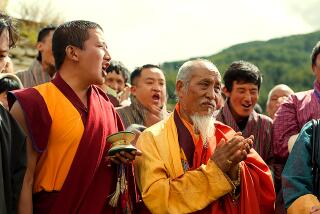New Ways Grapple With Tradition in ‘Himalaya’
- Share via
Eric Valli’s “Himalaya,” a 1999 Oscar nominee for foreign-language film, takes place in a remote place: the mountainous Dolpo region of Nepal and a cradle of Tibetan culture. As for the time, it is apparently the present but could just as easily be centuries ago, so unchanged--so far--is the Dolpopas’ ancient, rugged way of life. The setting for the film is awesome natural grandeur, a seemingly endless range of snow-covered mountains where life is so hard you wonder how civilization took hold there in the first place.
The film’s introductory shots include one of a rock-walled village resting on a promontory over a deep crevasse. Just below is a wheat field, and in its midst the wiry old village elder, Tinle (Thinlen Lhondup), who is explaining to his grandson Tsering (Karma Wangiel) that the field’s harvest will support the community for only three months. Tinle is awaiting the return of his son and tribal leader heading a yak caravan bearing salt. Tinle is a colorful, fiery old guy, and when his son is brought back dead on the back of a yak, he immediately accuses the caravan’s second-in-command, Karma (Gurgon Kyap), of having caused his son’s death. Karma has been the son’s best friend, and everyone in the caravan supports Karma’s assertion that the son attempted a foolhardy shortcut on his own, forbidding Karma and, apparently, everyone else from following him.
His grief manifesting as rage, Tinle isn’t about to listen to anyone. He’s determined to lead the yak caravan--still loaded with salt to be exchanged for grain--down the mountain, a trek on foot that takes some three weeks to a month. Never mind that Tinle hasn’t led the trek for a decade; he wants to hold on to the tribal leadership so he may pass it on to his grandson. At first demurring, his second son, Norbou (Karma Tenzing Nyima Lama), ensconced in a monastery since age 8, decides to join forces with his father, as inexperienced as he is with caravan life. Tinle’s daughter-in-law Pema (Lhakpa Tsamchoe) also comes along.
The drama’s central conflict is between Tinle and Karma. Tinle is a fearless and wise leader with a will of iron, sharp in mind and spirit, but his physical strength is undermined by advancing age. Karma is the tribe’s natural leader, a pragmatist who doesn’t put much stock in old beliefs and traditions. Tinle would be impossible if he weren’t so funny in his sheer outrageousness, yet there is real poignancy in his resistance to passing the baton to a younger man, especially one who is not his son. Out of their clash comes a reaffirmation of faith, expressed in the traditional ways, some of which could be too easily dismissed as superstition.
Such complexity and personality among key figures keeps “Himalaya” involving throughout its grueling journey and lifts the film above the merely ethnographic. A veteran photographer and author honored by the King of Nepal for his many books on the country, Valli was able to draw upon a 20-year friendship with Lhondup in getting such a vibrant and unself-conscious performance in the film’s linchpin role. Indeed, Valli’s ability to draw natural performances from nonprofessionals is remarkable. As Karma, Kyap has the impact of a young Toshiro Mifune, whom he resembles in his sensual presence. Tsamchoe is striking as Pema, and it is only natural that Karma and she would be drawn to each other. An absorbing film, “Himalaya” represents a formidable challenge well met.
* Unrated. Times guidelines: suitable for all ages.
‘Himalaya’
Thinlen Lhondup: Tinle
Gurgon Kyap: Karma
Karma Wangiel: Tsering
Lhakpa Tsamchoe: Pema
Karma Tenzing Nyima Lama: Norbou
A Kino International release of a Franco-Swiss-U.K. co-production of Galatee Films, France 2 Cinema, Bac Films, Les Productions de la Gueville, Les Productions J.M.H., Antelope and National Studio Ltd. Director Eric Valli. Producers Jacques Perrin and Christophe Barratier. Executive producer Jean de Tregomain. Screenplay by Olivier Dazat, with the collaboration of Jean-Claude Guillebaud, Louis Gardel, Nathalie Azoulai and Jacques Perrin. Cinematographers Eric Guichard and Jean-Paul Meurisse. Editor Marie-Josephe Yoyotte. Music Bruno Coulais. Costumes Karma Tundung Gurung and Michel Debats. Set designer Jero^me Krowicki. Frescoes by Tenzing Norbu Lama. Technical advisor Michel Debats. In Tibetan, with English subtitles. Running time: 1 hour, 44 minutes.
At selected theaters.
More to Read
Only good movies
Get the Indie Focus newsletter, Mark Olsen's weekly guide to the world of cinema.
You may occasionally receive promotional content from the Los Angeles Times.








